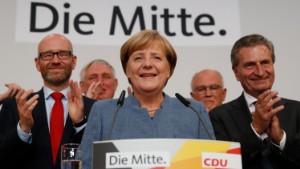Merkel gets a fourth term but German voters deliver far-right surge
Berlin (CNN)Angela Merkel has won a fourth term as German Chancellor, but with her party's lead in parliament cut and the country facing a surge in support for the far right.
Exit polls predicted the hard-right Alternative for Germany (AfD) would become the third-largest group in the national parliament, the Bundestag, as German voters delivered a stinging blow to the traditional parties.
Merkel's center-right CDU and its sister CSU had their share of the vote slashed. Germany's oldest party, the center-left SPD, which had been in a "grand coalition" with Merkel, was consigned to opposition.
Addressing her supporters, a subdued Merkel said the result gave her a "mandate" to govern but that the AfD's success would require "thorough analysis" to understand the concerns of their voters.
The exit polls showed Merkel's CDU/CSU group would be the largest in the Bundestag, but with its lead cut to 33.5% of the seats, down from 41.5% in 2013. The SPD fell to 21% from 25.7%, a result met with shock at the party's headquarters. It was the CDU's worst result since 1949, and the SPD's worst since 1945.
The AfD, founded only four years ago, became the first far-right party to enter the Bundestag since 1961, with a seat projection of 13%, according to FORSA polling institute data commissioned by German public broadcaster ZDF.
Addressing her supporters, Merkel pledged to try and understand the concerns of voters who lent their support to the AfD. "There's a big new challenge for us, and that is the entry of the AfD in the Bundestag," she said. "We want to win back AfD voters."
SPD leader Martin Schulz said the result was a "bitter disappointment" and the party would not continue in coalition. During the election campaign, Schulz found it hard to mount an effective opposition to Merkel, as his party had been inextricably linked to her policy decisions. More symbolically, had the SPD remained in coalition, the AfD would have been the largest opposition party.
Rise of AfD
The AfD's local party leader in Berlin, Georg Pazderski, declared its success a "political earthquake."
Founded in 2013, the AfD rose to prominence on the back of an anti-immigration stance and its opposition to Merkel's decision to open the country's borders to over a million migrants, mainly those fleeing violence and persecution from the Middle East. The party's opponents say it has stoked Islamophobia in Germany.
The AfD polled particularly strongly in East Germany, which includes Berlin, attracting 21.5% of the vote, according to exit polling conducted by by Infratest Dimap. In the West, it scored about 11%, the projections said. The results put the AfD on course to become the second largest party in the East, after the CDU.
News Courtesy: www.cnn.com











